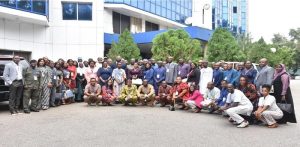The Director, Centre for Climate Change and Development Alex Ekwueme Federal University (AE-FUNAI), Prof. Chukwumerije Okereke, has expressed dismay over the negligence of the local people in intervention efforts on climate change adaptation and mitigation in Nigeria.

Prof. Okereke, who is also a Senior non-resident Fellow at APRI, stated this during the final stakeholders’ workshop organised to share the key findings of the project on understanding the effectiveness of Local Communities in taking necessary action through locally-led adaptation (LLA) which started in 2022 with sponsorship from Africa Policy Research Institute (APRI) Berlin, Germany, in close collaboration with the Centre for Climate Change and Development (CCCD) of AE-FUNAI and the Department of Climate Change (DCC) of the Federal Ministry of Environment, held in Abuja on Tuesday, August 8, 2023.
Prof. Okereke lamented what he described as “over-concentration” of intervention efforts at the national and sub-national levels at the negligence of the local people who are sometimes the most vulnerable. He pointed out that the often-neglected local people possess potentials such as intelligence and resourcefulness in innovating ways of adapting to climate change. These potentials, he said, must not be overlooked by policy makers.
Prof. Okereke cautioned against Mal-Adaptation which causes more problems in the bid to introduce adaptation strategies. According to him, adaptation strategies should be context-specific and context-sensitive if they must effectively address existing problems. He encouraged capacity building of human resources through training and re-training so as to achieve country and community ownership for sustenance of project results and recommended practices.
Speaking on the project context, Dr Grace Mbungu, Head of Climate Change Programme, APRI-Berlin, noted that much work had been undertaken by individuals on climate adaptation with several climate change adaptation and mitigation plans and frameworks in Nigeria, yet the status of available adaptation practices is not clear in the policy documents, thus no clear assessment of implementation gaps and locally led processes.
Dr. Mbungu further advocated for Nigeria’s adoption of a bottom-top approach during decision-making process by involvement of vulnerable communities and stakeholders in order to harness their ideas, local knowledge and practices. Through this strategy, she said that Nigeria can mainstream locally led adaptation (LLA) in her adaptation plans which would ensure effective, efficient and equitable adaptation action implementation.
In her opening remarks, the Director, DCC, Dr Iniobong Abiola-Awe, who represented the permanent secretary, Federal Ministry of Environment, expressed happiness on the high turnout to the workshop amidst the short notice. She reiterated the impacts of climate change as experienced by everyone today in all aspects of life hence the need to assess the adaptation strategies adopted by communities to mitigate the impacts of climate change.
Dr Eloka Okeke, senior research fellow, APRI-Berlin, while presenting the report of the project, made a summary presentation of findings from the project. Dr. Okeke explained that the project focused on the experiences of the three case study communities, their adaptive strategies, best practices and pathways, gaps and challenges. The presentation elicited comments and questions from participants including passionate appeals to extend the project to the other parts of the country and the integration of climate change education into the curriculum of schools for improved awareness creation on climate change concepts and issues.
In his brief remarks, Prof Chinedum Nwajiuba, the immediate past Vice-Chancellor of Alex Ekwueme Federal University, Ndufu Alike, reminded the participants about the contributions of NASPA-CCN in creating a pathway for climate change adaptation and mitigation plans and framework for Nigeria.
The final stakeholders’ workshop was attended by the permanent secretary of the Ministry of Environment represented by Dr Iniobong Abiola-Awe, Director, Department of Climate Change (DCC); Dr Abimbola Olumide, the Executive Director, APRI-Berlin; Dr Grace Mbungu, Head of Climate Change Programme, APRI-Berlin; Prof Chukwumerije Okereke, Director, CCCD AE-FUNAI; and Prof Chinedum Uzoma Nwajiuba, immediate past Vice-Chancellor, AE-FUNAI.
Other participants included representatives from civil society organisations (CSOs), policy makers, think-tanks from the academia, and representatives of student groups, among others.
The APRI project report was presented and launched by the permanent secretary of the Ministry of Environment, represented by Dr Abiola-Awe of the DCC.
The workshop was aimed at working closely with key policymakers, CSOs, NGOs and other relevant stakeholders to develop key policy priorities for locally-led adaptation in Nigeria as well as launching of the flagship report titled “Unlocking Adaptation Potential: Insights into Nigeria’s Climate Change Policies, Initiatives, and Local Actions”.
This comprehensive report delves into the critical issue of climate change adaptation and explores locally-led strategies and initiatives to address the challenges posed by climate change in Nigeria, identifying barriers and enabling factors for adaptation to inform the country’s Nationally Determined Contribution (NDC) implementation.
The report, which is based on rigorous research and case studies conducted across various ecological zones of Nigeria, highlights the growing impact of climate change on vulnerable communities and ecosystems. It sheds light on the importance of locally-led adaptation as a key approach to building resilience and safeguarding livelihoods in the face of climate-related risks. The report also underscores the significance of placing local communities at the heart of climate change adaptation efforts.
During the event, speakers emphasised the importance of collaboration in climate change adaptation and the role of locally-led initiatives.
By Chinwe Ogunji
